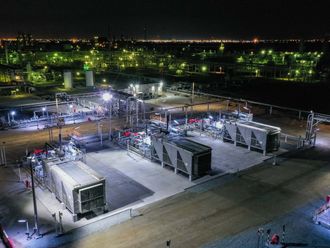London: Oil fell for a third day in New York on speculation that territorial gains by Libyan rebels may quicken a resolution to the country's civil war.
Futures declined as much as 0.8 per cent after insurgents recaptured the Libyan oil port of Ras Lanuf yesterday while allied warplanes began airstrikes on the capital, Tripoli. In Japan, radiation hampered efforts to cool stricken reactors at the Fukushima Daichi plant while damage from the March 11 earthquake slowed the supply of materials to manufacturers. Prices have gained 15 per cent this quarter, the most since the three months ended June 2009.
"The gains by the anti-Gaddafi rebels are a good explanation for the short-term weakness this morning," said Christopher Bellew, senior broker at Bache Commodities Ltd. in London. "But their advances are far from the end of story. Even if Gaddafi is overthrown, there might be civil war for an extended period, as in Iraq."
Crude for May delivery fell as much as 86 cents to $104.54 (Dh383.66) a barrel in electronic trading on the New York Mercantile Exchange. It was at $104.82 at 10.43am London time.
Longest decline
The contract was down for a third day, the longest decline since a four-day drop through March 11. Brent crude for May settlement slipped as much as 86 cents, or 0.7 per cent, to $114.73 a barrel on the London-based ICE Futures Europe exchange.
The highest gasoline prices since October 2008 in the US, the world's largest oil consumer, are raising concern over economic prospects, according to a Bloomberg News survey. The Conference Board's report on consumer confidence, due today, may show its index fell to 65 this month from 70.4 in February based on the median of 54 economist estimates.
"Investors will be pausing for any prospects of delays in the Japanese recovery effort following this nuclear issue or radiation," said Serene Lim, an energy and commodity strategist at Australia & New Zealand Banking Group Ltd in Singapore. New York futures for May rose as high as $108.25 a barrel on March 7, a technical level that may stall a rally, according to Stephen Schork, president of the Schork Group Inc., a consultant in Villanova, Pennsylvania.
Resistance
"We will look for resistance at May's 2011 high," Schork said in a note yesterday. "Unless something especially severe happens in the Middle East, of course, in which case all bets are off." Crude has rallied 25 per cent in New York since anti-government protests began February 15 in Libya, a member of the Organisation of Petroleum Exporting Countries. The conflict is the bloodiest in uprisings that have unseated the presidents of Tunisia and Egypt and spread to Algeria, Syria and Yemen. The North Atlantic Treaty Organisation yesterday agreed to take command of all military operations related to enforcement of a UN mandate.












